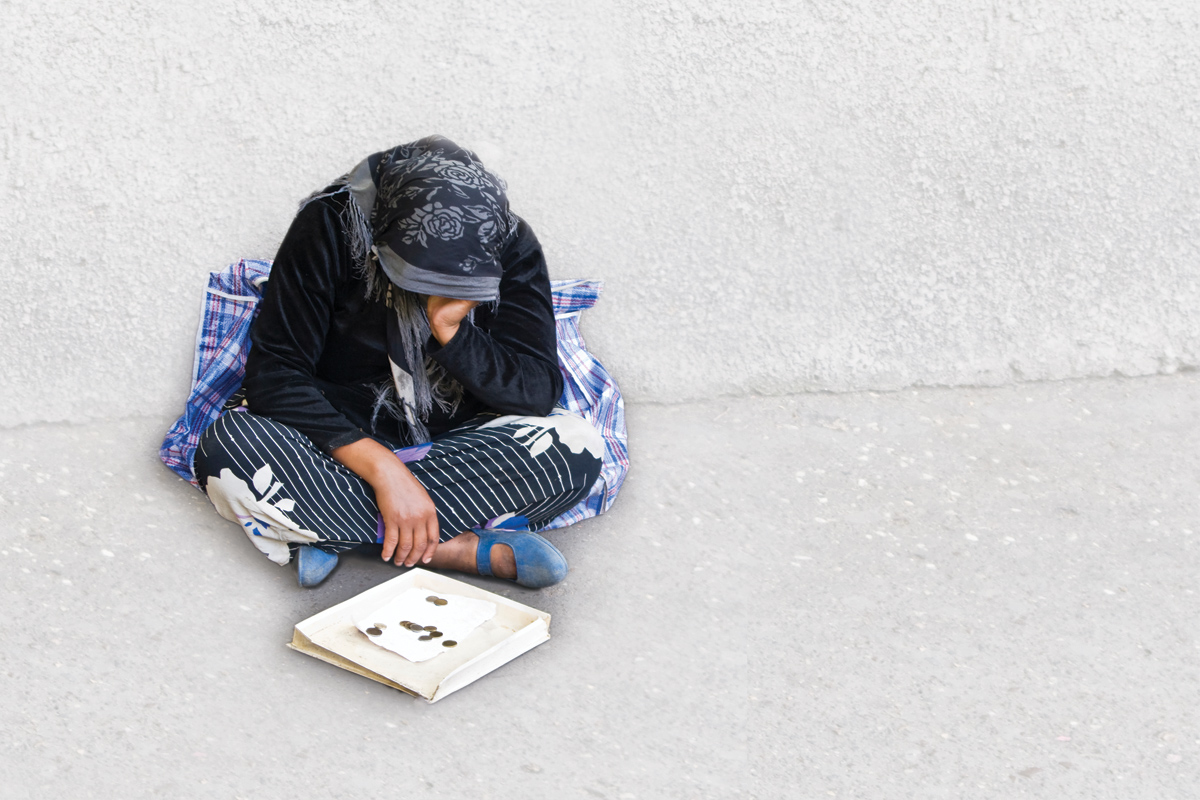I grew up in small-town Ontario and never encountered homeless people, panhandlers or “bums,” as the people in my world called them then. So when I went to New York City on my honeymoon in 1986 at age 23, I was shocked. There were destitute people everywhere — curled up over subway grates on sidewalks, sleeping on benches in Central Park and slumped against the luxury storefronts on Fifth Avenue.
When my husband gave an older panhandler $10, the man was so taken aback he slung his arm around my husband’s shoulder and offered to buy him a hotdog. And I’ll never forget the young woman, literally barefoot and very pregnant, asking people on the street for dimes. Yes, dimes. “God bless you! God bless you!” she sang out when I handed over a few coins.
You may unsubscribe from any of our newsletters at any time.
The impulse in my youthful days was to give money to pretty much anyone who asked. In the years since, certain incidents have made me more cautious. I once had a ragged man in Cleveland yell at me after I turned down his request for money. “I’m a Vietnam vet!” he railed. “I almost died for this country!” Then there was the woman who asked for bus fare to get to a shelter in a neighbouring city — but turned down my offer of a ride. To be sure, there have been positive encounters, too: a quiet exchange in a supermarket parking lot when I invited a homeless man to pick out what he wanted from my cart, his eyes lighting up at a bag of oranges. A handful of times, I’ve bought sandwiches or coffee for people — usually women, because I’m not as comfortable with men on the street. But more often than not, I walk on by, proffering a weak smile. When I do give money, it’s usually on a whim — I’m in a particularly good mood, or change is easily accessible. Maybe it’s close to Christmas and I don’t want to be a Scrooge, or my kids are with me and I feel I should set a good example.
The truth is, most of the time I just don’t know what to do.
In search of answers, I take my dilemma to the oracle. No, not the Good Book in this instance: Facebook. I ask my friends what they do in this situation, and the post generates almost 60 responses. Most say yes, they try to give something, either money or food. A brave few occasionally strike up conversations and have even offered handshakes and hugs. One handed out Christmas cards to some of the street people she sees regularly. Some stopped giving after negative experiences — their offer of food was refused, or they were asked to cough up more money. Several noted that giving money is an easy feel-good fix that takes a lot less sacrifice than, say, serving food at a shelter or writing a generous cheque to an anti-poverty organization.
My friend Hugh MacLeod put it this way: “While I may feel transiently assuaged of my inherent guilt of privilege, on the balance of probabilities it is more likely that I am not helping the person by giving them money. Donating to systems is a better use of resources.” Rene Chouinard pointed out that if we give to people on the street, it absolves governments of their responsibility to care for the poor. “If we are content to sit on our butts rather than improve social programs, then yes, give them a dollar or two. But the better response is political.”
Many of my friends said they give food instead of money because they worry the cash will be used to feed addictions. But advocates for the homeless will tell you that with shelters and soup kitchens, food isn’t usually hard to find. “Often they aren’t hungry; they’re hurting,” Christina Miller Paradela, a diaconal minister at Rock Chapel and Lynden United churches in Hamilton, commented on my Facebook post. When it comes to giving food, she noted, “Your priority might not be their priority. Maybe they need a cigarette.”
Indeed, there’s a strong likelihood that any money you give will be used to buy alcohol, drugs or cigarettes. Thames Reach, a British charity for the homeless, estimates that 80 percent of people asking for money on the street are using it for drugs. But when you consider most have landed on the street because of an accident of birth or circumstance — raised in an abusive home, born with a mental illness, a victim of job loss and systemic poverty — should the rest of us blame them for seeking a bit of oblivion? Some addicts will do anything to get money for drugs — including stealing and selling their bodies. That’s why some argue that giving to panhandlers is actually a form of harm reduction.
Although I appreciated the active dialogue on Facebook, I still didn’t have the clarity I needed. To give or not to give? As the online conversation proved, there are compelling arguments on both sides.
“Your struggle is similar to everyone’s,” Bruce Rivers, executive director of Covenant House, which serves homeless youth in Toronto, assures me. “There’s no silver bullet; no single right answer.” He says deciding whether or not to give is often determined by using one’s best judgment in the situation.
But he and others say there are specific steps we can all take that will allow us to hold our heads high when confronted by the down-and-out.
1. Be human. Make eye contact. Smile. Say hello. “Even if I say no, I always engage and say ‘sorry,’ and most people wish me a good day,” says Paul Johnson, the former executive director of Hamilton’s Wesley Urban Ministries, a United Church outreach centre.
2. Be generous in whatever way you can. You might distribute a few dollars on payday or occasionally offer to buy coffee and have a brief conversation with someone on the street. Maybe you make a monthly donation to an organization committed to fighting poverty. Or you knit winter hats and mittens for the homeless or ladle soup at a shelter. The important thing is to do something. “Generosity is a divine gift, and it’s a virtue we need to cultivate,” says Rev. Harry Oussoren, who worked for many years in the local ministries unit of the United Church’s General Council. “That doesn’t mean we have to give everything away, but it does mean we respond generously, whether that’s with words or money or some other way.”
3. Be brave. Let’s face it: few of us are at ease striking up a conversation with a street person, but that doesn’t mean we can’t try. “There is fear about forming a relationship with people who evidently aren’t as socially acceptable as you,” says Oussoren. At the same time, use common sense when approaching those you don’t know. Says Rivers of Covenant House, “Sometimes not engaging with someone who has obvious mental health issues is probably the right thing.”
4. Be political. Rev. Sally McShane doesn’t usually give out money on the street, but the minister of First United Church, which provides meals, housing, healing and advocacy to the homeless in Vancouver’s Downtown Eastside, sent 200 handwritten letters in 2015 to then-prime minister Stephen Harper highlighting the plight of the homeless. Although she never received a response, “It makes me feel I’m doing something,” she says. As Oussoren puts it, “We have to be politically active. We, as citizens of one of the wealthiest countries in the world, shouldn’t tolerate visible poverty in our midst.”
I know I’ll always be somewhat wary when approached by panhandlers, but I hope the advice above — be human, be generous, be brave, be political — will remind me to temper my caution with a little more compassion and care the next time someone holds out their hand to me.
This story first appeared in The Observer’s January 2016 issue with the title “Panhandler protocol.”














